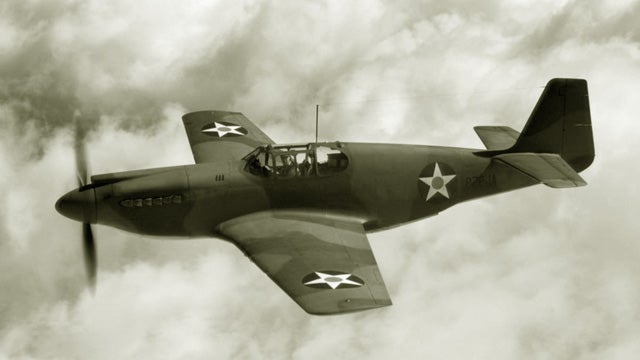RUSH: Here’s Ed, Winter Springs, Florida. You’re next. Great to have you on the EIB Network. Hi.
CALLER: Thanks for having me on, Rush. Hey, I called because of something that we have in common. I heard you speak about your dad’s service during World War II and that he happened to be in the China-Burma-India Theater and flew P-51 Mustangs, much like my dad who was also a World War II veteran, and he was very humble and very quiet about his service.


RUSH: You are kidding me. Your dad was on the runway crew?
CALLER: That is exactly right. And guys like your dad used that landing strip so they could help our Chinese allies and —
RUSH: Yeah.
CALLER: — occupy China and also to fly runs over Burma and to fly over The Hump, which, well, I guess for your listeners in Rio Linda, would be the Himalayas.
RUSH: You know, my dad loved the P-51. He had models of it, he talked about it. To him, it was the greatest airplane that wasn’t a jet that he had ever flown. He never flew a jet, but he raved about it. But, you know, you said something there, Ed, that is true. He would not talk to my brother and I, or me, about the killing aspects of war, or very much else, for that matter.
And a couple of his friends, who also had kids my age in our little hometown, Dr. Jim Kinder was in the Navy. They, as part of their conscience and their overall existence, they would not talk about it. They wouldn’t. And, you know, we’re young kids, and we’re running around, “Hey, Dad, how many enemy planes did you shoot down?” Very somber face, no answer. “Not important, Son.” Did not want to talk about it.
In war, as little kids, it is what you’d see on TV and movies. He had lived it. I think it was a cultural thing of many who survived World War II, ’cause, folks, I’ll tell you, the people that fought in World War II, their families had gone through the Great Depression. Many of them had experienced some aspect of World War I.
And that’s why when Khrushchev shows up after all of this at the United Nations and promises to bury grandchildren and children, they took it seriously. They couldn’t afford not to. Their whole lives were absorbed and devoted to defending the country and protecting it against seemingly every 10 years somebody new came along that wanted to literally conquer us and wipe us out.
So, it was deathly serious stuff, and it was never-ending. And it took an entire national effort, the entire country had to come together. There were a very few number of people that didn’t, but for the most part it was an incredible example of unity. The whole country came together because the war is being fought in the Pacific and in Japan and throughout Europe.
And we were attacked by Japan and threatened by Germany, and our allies clearly were. And the importance of it, the vital aspects of it were what my dad talked to us about and how horrible it all is and how it’s not exciting and it’s not something to aspire to and that the real objective is to never have to do it.
And that’s when I remember my first lecture on the reason for having a gigantically powerful military so that it itself is a deterrent against anybody else attacking you. You know, that’s why nuclear weapons, if we’re gonna have ’em, we’re gonna have more than anybody else. If we’re gonna have strategic invisible bombers, we’re gonna have the best ones and we’re gonna have more than anyone else. We’re gonna make sure the world knows they can’t beat us.
This is what people that fought World War II, came out of the Great Depression, that’s the lesson they learned from it. They didn’t want their kids to ever have to do it, go through it. And so not romanticizing it and building it up as something to aspire to I think is one of the reasons why our questions weren’t answered.

